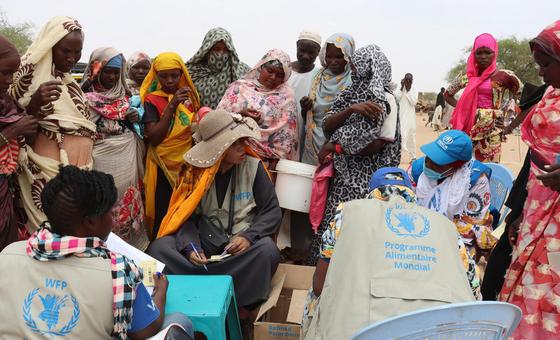The World Food Programme announced the operation on Tuesday and warned that lifesaving programmes in Chad will stop because of a funding crunch “in a matter of weeks”.
Thousands of Sudan refugees continue to stream over the border into Chad to escape heavy fighting between warring generals that began last April.
Around one million people have already sought shelter.
The aid they need must be delivered before seasonal rains flood roads serving camps for the displaced in the east, cutting off access, WFP said.
Most refugees cross the border into Sudan traumatised, hungry and with “horrific tales of violence”, the UN agency reported.
It noted that the new arrivals rely entirely on humanitarian assistance to survive and that four in 10 Sudanese refugee children under five suffer from severe anaemia.
“The spillover from the crisis in Sudan is overwhelming an underfunded and overstretched humanitarian response in Chad. We need donors to prevent the situation from becoming an all-out catastrophe, warned WFP Country Director in Chad, Pierre Honnorat.
Supply route at risk
The UN agency explained that a vital cross-border supply route into Sudan’s conflict-scarred Darfur region is also at risk.
This is the only “reliable” route into embattled western Sudan, said WFP, which said that it had made it possible to help one million people in Darfur since last August.
“Cutting assistance to communities facing this level of vulnerability is unthinkable,” Mr. Honnorat said, warning that families had no option but to “skip meals and eat less nutrition food, laying the ground for crises of nutrition, crises of instability and crises of displacement”.
To ensure continued support to crisis-affected people in Chad over the next six months, WFP urgently needs $242 million.

A boy stands inside the remains of his school in Novohryhorivka, Ukraine.
Ukraine and Education Cannot Wait announce funding for new resilience programme
The Government of Ukraine and the UN-backed Education Cannot Wait (ECW) initiative announced $18 million in catalytic grant funding on Tuesday for a new Multi-Year Resilience Programme that will benefit over 150,000 children across ten of Ukraine’s most impacted areas.
The new catalytic grant builds on ECW’s $6.5 million in previous investments in Ukraine, which have already reached more than 360,000 children and youth – 65 per cent of whom are girls – with quality education support.
The new ECW grant was announced by Ukraine’s Minister of Education and Science Oksen Lisovyi and ECW’s Executive Director Yasmine Sherif at UN Headquarters, in New York.
They called on donors to urgently mobilize an additional $17 million to fully fund the two-year programme.
Recent data indicate that at least 1.5 million of those internally displaced are children, about 225,000 of whom are of school age.
About three out of four of these children have witnessed bombing and shelling firsthand. Teachers have been equally impacted, with an estimated 43,000 teachers displaced by the conflict.
‘Rampant’ abuse of counter-terrorism laws, Human Rights Council hears
Abuse of counter-terrorism laws is “rampant” around the world, a top rights expert told the Human Rights Council in Geneva on Tuesday.
Addressing the UN’s top rights forum, Special Rapporteur Ben Saul said that some governments’ anti-terror efforts were characterized by unlawful killings, arbitrary detention, torture, unfair trials and mass surveillance.
Freedom of expression had been criminalized too, the independent rights expert insisted, along with the basic right to freedom of assembly, association and political participation.
These measures not only violate the rights of suspected criminals but can also jeopardise the freedoms of the innocent,” Saul said.
He pointed to “unjustified and protracted states of emergency” and “excessive military violence” by some authorities responding to terrorism.
Many governments had “failed to address the root causes of terrorism, including State violations of human rights”, he said.
Right to remedy for privacy violations in data protection is key
Countries worldwide must not only respect and refrain from violating the right to privacy and data protection but also promote the importance of those rights, an independent UN expert told the Human Rights Council on Tuesday.
The UN Special Rapporteur on the right to privacy, Ana Brian Nougrères, presented a report on data protection and privacy laws across a geographically diverse selection of States: Australia, Ecuador, Singapore, South Africa and Spain.
“These five states were studied as their respective legislation expressly recognise the right of individuals to be the owners of, and have control over, their personal information”, she said.
“To safeguard their dignity, individuals must have sufficient means and mechanisms at their disposal to be able to assert their right to privacy.”
She looked at whether citizens genuinely had control over their data and understood the legal avenues for redress and where appropriate “the reparation of the damage generated by the improper use” of their personal information.
“The mere recognition of a legal standard on the right to personal data protection does not guarantee the effectiveness or enjoyment of that right without the existence of an accessible and effective protection system”, she stressed.
The expert made three key recommendations calling on States to update and adopt legal frameworks on data protection, to identify and consider adopting aspects of other countries’ data protection and privacy legislation which may offer stronger guarantees and to “promote and foster human rights information and education in personal data protection and privacy, so that individuals understand how to can exercise their rights and, as necessary, avail themselves of remedies to ensure their effective enjoyment”.
Special Rapporteurs and other independent rights experts are not UN staff, do not receive a salary for their work and are independent of any government or organization.

